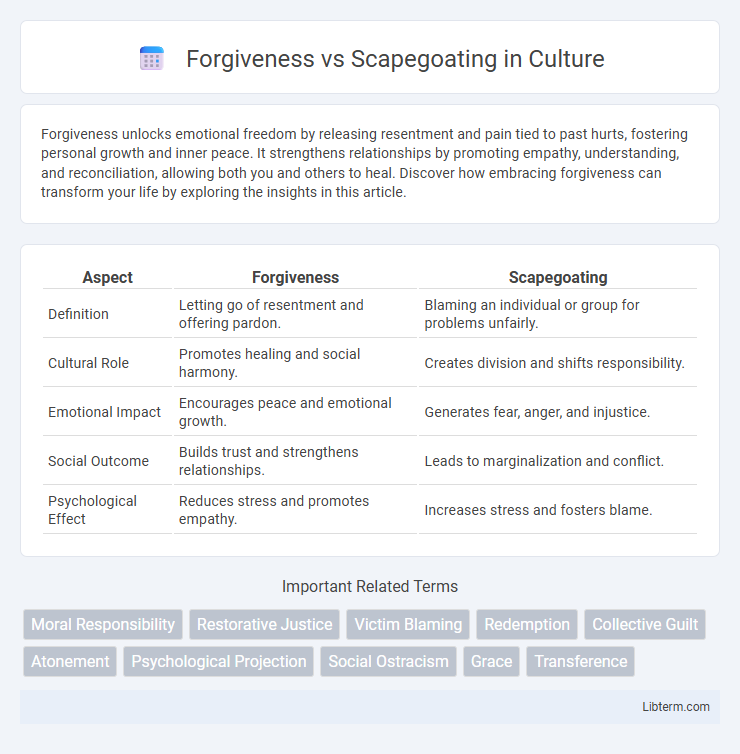Forgiveness unlocks emotional freedom by releasing resentment and pain tied to past hurts, fostering personal growth and inner peace. It strengthens relationships by promoting empathy, understanding, and reconciliation, allowing both you and others to heal. Discover how embracing forgiveness can transform your life by exploring the insights in this article.
Table of Comparison
| Aspect | Forgiveness | Scapegoating |
|---|---|---|
| Definition | Letting go of resentment and offering pardon. | Blaming an individual or group for problems unfairly. |
| Cultural Role | Promotes healing and social harmony. | Creates division and shifts responsibility. |
| Emotional Impact | Encourages peace and emotional growth. | Generates fear, anger, and injustice. |
| Social Outcome | Builds trust and strengthens relationships. | Leads to marginalization and conflict. |
| Psychological Effect | Reduces stress and promotes empathy. | Increases stress and fosters blame. |
Understanding Forgiveness: Definition and Importance
Forgiveness involves consciously releasing resentment and the desire for retaliation against someone who has caused harm, promoting emotional healing and psychological well-being. It contrasts sharply with scapegoating, where blame is unfairly assigned to an individual or group to deflect responsibility, fostering division and injustice. Understanding forgiveness's role in conflict resolution highlights its importance in restoring relationships and encouraging empathy in social and personal contexts.
What is Scapegoating? Origins and Impact
Scapegoating is the practice of unfairly blaming an individual or group for problems or negative outcomes, often to divert attention from the actual causes. Its origins trace back to ancient rituals, such as the biblical Day of Atonement where a goat symbolically carried the community's sins, highlighting its cultural and psychological roots. Scapegoating fosters social division, perpetuates injustice, and hinders conflict resolution by promoting false accountability and emotional harm.
Psychological Roots of Forgiveness
Forgiveness originates from psychological processes involving empathy, emotional regulation, and cognitive reframing, which allow individuals to move beyond feelings of betrayal and resentment. Unlike scapegoating, which externalizes blame and perpetuates negative emotions, forgiveness promotes healing by reshaping neural pathways associated with pain and attachment. Research shows that forgiveness activates brain regions linked to empathy and compassion, contributing to improved mental health and interpersonal relationships.
The Mechanisms Behind Scapegoating
Scapegoating involves projecting blame onto an individual or group to deflect responsibility and reduce collective anxiety, often rooted in psychological defense mechanisms like displacement and projection. This process exploits social dynamics by targeting vulnerable parties, creating an illusion of control and unity within the dominant group. Understanding these mechanisms reveals how scapegoating perpetuates conflict and hinders reconciliation, contrasting sharply with forgiveness, which fosters empathy and social healing.
Emotional Consequences: Forgiveness vs Scapegoating
Forgiveness fosters emotional healing by reducing stress and promoting empathy, leading to improved mental well-being and stronger interpersonal relationships. Scapegoating generates resentment, anger, and psychological distress, often escalating conflict and damaging social bonds. Choosing forgiveness over scapegoating supports emotional resilience and long-term psychological health.
Social Dynamics: Healing or Blaming
Forgiveness fosters social cohesion by promoting healing and reconciliation within communities, reducing interpersonal conflicts, and encouraging empathy and trust. Scapegoating, in contrast, disrupts social harmony by channeling blame onto individuals or groups, intensifying divisions and perpetuating cycles of resentment and hostility. Understanding these dynamics highlights how forgiveness supports collective resilience, while scapegoating undermines social stability and impedes conflict resolution.
Forgiveness in Personal Relationships
Forgiveness in personal relationships fosters emotional healing by releasing resentment and promoting empathy between individuals. It strengthens relational bonds and reduces conflicts, contributing to long-term psychological well-being. Embracing forgiveness cultivates trust and encourages open communication, essential elements for maintaining healthy and supportive connections.
Scapegoating in Families and Communities
Scapegoating in families and communities often involves unfairly blaming one individual for broader problems, which exacerbates conflict and hinders emotional healing. This dynamic perpetuates cycles of mistrust, social isolation, and unresolved trauma, impacting mental health across generations. Recognizing scapegoating patterns is essential for fostering accountability and promoting healthier, more supportive relationships.
Case Studies: Real-Life Examples of Forgiveness and Scapegoating
Case studies reveal that forgiveness often leads to reconciliation and psychological healing, as seen in the post-apartheid Truth and Reconciliation Commission in South Africa, where victims and perpetrators engaged in dialogue and healing. In contrast, scapegoating commonly exacerbates social divisions and perpetuates injustice, exemplified by the Salem witch trials where innocent individuals were wrongfully blamed, resulting in fear and violence. These real-life examples demonstrate the profound impact of choosing forgiveness over scapegoating on societal cohesion and individual well-being.
Cultivating Forgiveness: Steps to Move Beyond Blame
Cultivating forgiveness requires acknowledging personal pain while releasing the need to assign blame, which fosters emotional healing and resilience. Practicing empathy and understanding the perspective of others helps in dismantling resentment and breaking the cycle of scapegoating. Engaging in reflective exercises, such as journaling or guided meditation, supports the development of compassion and enables individuals to move beyond past grievances toward reconciliation.
Forgiveness Infographic

 libterm.com
libterm.com